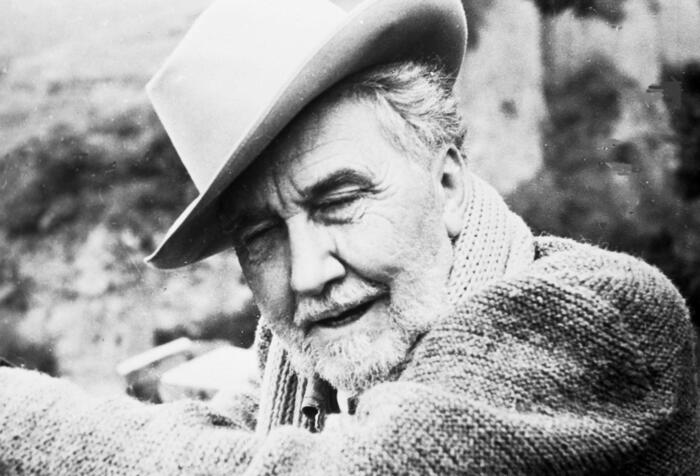A character now considered central to the culture of the twentieth century, Ezra Pound, whose 50th anniversary marks the 50th anniversary of his death in 1972 on November 1, was however an anomalous figure and, for his biography and `` having mistaken Mussolini for Jefferson '', the 'beloved American patriot among the drafters of the Declaration of Independence,' 'an example of civility and honesty' '.
He was also persecuted and then ideologically valued more for this than for his great poetic work and his activities in favor of others, which were characters like Eliot, who made him review his '' Wasteland '' later defining it '' the best blacksmith '', or Joyce, of which he published chapters of the '' Ulysses '' in magazine and was thus denounced for obscene publication,
His 116 '' Cantos '' are of a very demanding, difficult reading, but no more than what '' Ulysses '' and even more '' Finnegans Wake '' were considered at the time.
'' Poetic animal '', Pound had a stylistic ideal of poetry formulated through the concept of imaginism, initially elaborated abstractly and over time indicating its exemplification in Chinese poetry, discovered in 1913 and welcomed with enthusiasm.
For him, imaginism meant, to express oneself briefly, in synthesis, but understandably and in this the Chinese ideograms appeared to him as a model he thought he should and could approach the English language, thanks to his elementary grammar and flexibility.
After all, for him the real poetry was ''
Pound's American soul, an exile in Europe and mainly in Italy, starting from 1924 and practically, except for the 12 years from 1945 in a psychiatric hospital in the USA, until his death in Venice, had the spirit of someone who knows no borders and always explores new frontiers.
Thus he studies and approaches Confucius's China, which he translates into captivity, ancient Egypt, passes from the stilnovists, Dante, Cavalcanti, to the Renaissance so that in his writings and verses, more or less explicitly, everything dialogues and relates in '' an eternal present '', as another American poet called it, William Carlos Williams, who is filled with insidious and dismayed visions in a continuous, obsessive all-out exploration of human consciousness, finding only rubble before him.
The poet sees this very personal investigation of tradition as possible, without boundaries of space and time, only through the recovery of splinters, fragments, quotations.
`` His unheard-of song about him is interwoven with these fragments, which, having exhausted their function, do not survive it - notes Masolino D'Amico - Hence the impression of artificiality, so often reproached to his poetry '' .
A reading that is not really simple and always to be decrypted, in which, by undertaking an act of transmission of that tradition, he practically certifies its impossibility of transmitting it.
All this has like a surge starting from the verses written during and after the imprisonment, from the `` Cantos Pisani '' onwards that become `` dark forest '',
Pound, as a poet, as a man of culture, considered it a duty to deal with the socio-economic reality in which he lives and identifies in the clash between economics and finance the knot of the modern world with the problem of usury and the value of money at its center, dedicating it attention, both in the literary and poetic production, and in two essays entitled '' ABC of the economy '' and '' Work and usury ''.
It also derives from these ideas of his to think that Mussolini, but also Hitler, were fighting that reality and expressing their support and admiration, which, after the Liberation, cost him a trial for treason in his country, America, where he was declares unable to intend to want to and interned, for a period, before moving overseas, in the famous steel cage,
a safety cell without toilets or the possibility of sheltering from cold and heat, which will define the '' gorilla cage ''.
However, for his stubborn defense of his positions during the war it happened that the neo-fascist social center CasaPound was named after his name, so much so that his daughter Mary de Rachewiltz filed a lawsuit in 2011 for improper use of the surname, as he considered harmful in the memory of his father the association of the name Pound with a group that was responsible for serious violence.
Having remembered this, all that remains is to quote the ending of the last of his Cantos: '' charity sometimes I had it, / I can't make it flow. / A little light, like a glimmer / will lead us back to splendor ''.
And remember, in the words of Ernest Hemingway, that '' The best of Pound's writing, which is in the Cantos, will last as long as literature exists ''.
(HANDLE).








/cloudfront-eu-central-1.images.arcpublishing.com/prisa/S7ERVSCT4FUVX6R7TUVBDNTH5Y.jpg)


